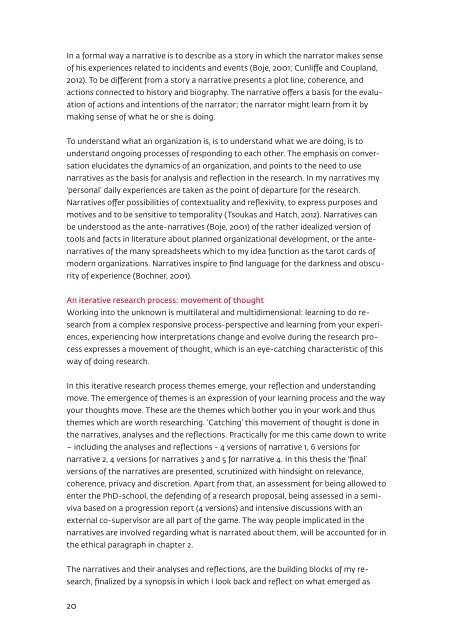Rumbling on performativity_Frits Simon
Rumbling on performativity_Frits Simon
Rumbling on performativity_Frits Simon
Create successful ePaper yourself
Turn your PDF publications into a flip-book with our unique Google optimized e-Paper software.
In a formal way a narrative is to describe as a story in which the narrator makes sense<br />
of his experiences related to incidents and events (Boje, 2001; Cunliffe and Coupland,<br />
2012). To be different from a story a narrative presents a plot line, coherence, and<br />
acti<strong>on</strong>s c<strong>on</strong>nected to history and biography. The narrative offers a basis for the evaluati<strong>on</strong><br />
of acti<strong>on</strong>s and intenti<strong>on</strong>s of the narrator; the narrator might learn from it by<br />
making sense of what he or she is doing.<br />
To understand what an organizati<strong>on</strong> is, is to understand what we are doing, is to<br />
understand <strong>on</strong>going processes of resp<strong>on</strong>ding to each other. The emphasis <strong>on</strong> c<strong>on</strong>versati<strong>on</strong><br />
elucidates the dynamics of an organizati<strong>on</strong>, and points to the need to use<br />
narratives as the basis for analysis and reflecti<strong>on</strong> in the research. In my narratives my<br />
‘pers<strong>on</strong>al’ daily experiences are taken as the point of departure for the research.<br />
Narratives offer possibilities of c<strong>on</strong>textuality and reflexivity, to express purposes and<br />
motives and to be sensitive to temporality (Tsoukas and Hatch, 2012). Narratives can<br />
be understood as the ante-narratives (Boje, 2001) of the rather idealized versi<strong>on</strong> of<br />
tools and facts in literature about planned organizati<strong>on</strong>al development, or the antenarratives<br />
of the many spreadsheets which to my idea functi<strong>on</strong> as the tarot cards of<br />
modern organizati<strong>on</strong>s. Narratives inspire to find language for the darkness and obscurity<br />
of experience (Bochner, 2001).<br />
An iterative research process: movement of thought<br />
Working into the unknown is multilateral and multidimensi<strong>on</strong>al: learning to do research<br />
from a complex resp<strong>on</strong>sive process-perspective and learning from your experiences,<br />
experiencing how interpretati<strong>on</strong>s change and evolve during the research process<br />
expresses a movement of thought, which is an eye-catching characteristic of this<br />
way of doing research.<br />
In this iterative research process themes emerge, your reflecti<strong>on</strong> and understanding<br />
move. The emergence of themes is an expressi<strong>on</strong> of your learning process and the way<br />
your thoughts move. These are the themes which bother you in your work and thus<br />
themes which are worth researching. ‘Catching’ this movement of thought is d<strong>on</strong>e in<br />
the narratives, analyses and the reflecti<strong>on</strong>s. Practically for me this came down to write<br />
– including the analyses and reflecti<strong>on</strong>s - 4 versi<strong>on</strong>s of narrative 1, 6 versi<strong>on</strong>s for<br />
narrative 2, 4 versi<strong>on</strong>s for narratives 3 and 5 for narrative 4. In this thesis the ‘final’<br />
versi<strong>on</strong>s of the narratives are presented, scrutinized with hindsight <strong>on</strong> relevance,<br />
coherence, privacy and discreti<strong>on</strong>. Apart from that, an assessment for being allowed to<br />
enter the PhD-school, the defending of a research proposal, being assessed in a semiviva<br />
based <strong>on</strong> a progressi<strong>on</strong> report (4 versi<strong>on</strong>s) and intensive discussi<strong>on</strong>s with an<br />
external co-supervisor are all part of the game. The way people implicated in the<br />
narratives are involved regarding what is narrated about them, will be accounted for in<br />
the ethical paragraph in chapter 2.<br />
The narratives and their analyses and reflecti<strong>on</strong>s, are the building blocks of my research,<br />
finalized by a synopsis in which I look back and reflect <strong>on</strong> what emerged as<br />
20



